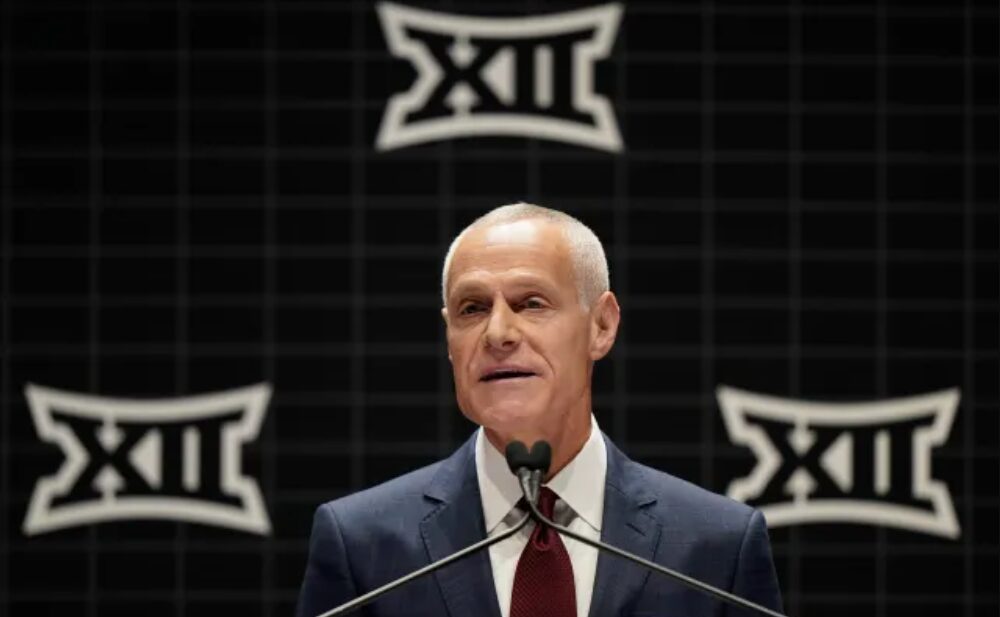Big News for the PAC 12
Big 12 commissioner Brett Yormark’s extension has a notable termination date
The college football offseason continues to be anything but quiet, with another week bringing a wave of impactful updates across both former Pac-12 programs and other schools around the country. Here are four major developments you may have missed:
1. Brett Yormark Gets a Big 12 Contract Extension
The Details: Big 12 commissioner Brett Yormark, originally under contract through 2027, has secured a three-year extension that will keep him in charge through the summer of 2030.
Why It’s Important: This move was expected, given Yormark’s success in reshaping the conference and enhancing its national profile. But the timing is especially meaningful. With the Big 12’s media rights deal ending in 2031, the next agreement will likely be negotiated around 2030—during Yormark’s extended term. He’ll play a central role in future expansion plans and choosing media partners.
More significantly, Yormark will lead the conference during a critical period (2028–2029), when key decisions could redefine college football. These include potential College Football Playoff format changes, possible Big Ten expansion, and the looming threat of top ACC schools departing as exit penalties shrink. His leadership will help position the Big 12 in the evolving college football landscape.
2. White House Looks at College Sports Reform
The Details: Reports suggest the Trump administration is preparing to launch a federal commission focused on college athletics, with Nick Saban and Texas Tech donor Cody Campbell expected to co-chair the panel.
Why It’s Important: College sports are currently mired in chaos—from the transfer portal to NIL deals to mounting lawsuits challenging the NCAA’s authority. While the pending settlement in the House v. NCAA case may introduce revenue sharing and some rule enforcement, it won’t solve deeper legal issues tied to amateurism.
What’s missing is structure—either through a collective bargaining agreement with athletes (which would require them to be deemed employees) or legislation from Congress. While previous lobbying efforts have largely failed, this new commission could push lawmakers to act. Although it won’t have legal authority itself, the spotlight it shines on college athletics could be a game-changer.
3. College Football Playoff Expansion to 16 Teams?
The Details: CFP commissioners from the SEC, Big Ten, ACC, and Big 12 met in New York this week, where talk of a 16-team playoff format gained traction, according to ESPN.
Why It’s Important: Until now, a 14-team expansion was widely assumed. But now, the power conferences appear to favor a larger 16-team model, with more at-large spots to go around. The format being discussed—dubbed 4-4-2-2-1-3—would allocate four spots each to the SEC and Big Ten, two to both the ACC and Big 12, one to the highest-ranked Group of Five team (or a retooled Pac-12), and three at-large bids.
This would give independent programs like Notre Dame a feasible route to the postseason, while also rewarding high-performing teams outside the power leagues. However, scheduling will be tricky. A 16-team playoff would need to begin the weekend before Christmas to maintain a four-round format—at a time when the NFL dominates television with games on multiple days.
The future of college football is taking shape now, not later. From leadership stability in major conferences to federal interest and postseason format changes, the coming years are poised to redefine the sport as we know it.
Would ESPN, which currently holds the broadcasting rights to the College Football Playoff, even want to take on additional games? If not, would they consider sub-licensing some of the matchups to networks like TNT or TBS? And most importantly, what kind of price would they be willing to pay for extra games that may not attract major viewership?
These are key questions that decision-makers must weigh as momentum builds behind an expanded CFP format.
4. What’s Next for the Pac-12 and Mountain West
The Basics: The Pac-12 and Mountain West have agreed to enter mediation to resolve two ongoing legal disputes:
-
The “poaching penalty” lawsuit, brought by the Pac-12, which seeks $55 million in damages over claims that the Mountain West improperly lured away member schools.
-
The “exit fee” case, in which Boise State, Colorado State, and Utah State are suing the Mountain West over $100 million in fees they argue should not be imposed on schools that are leaving.
The first mediation session is set for May 19.
Why It’s Significant: Neither side wants to see these cases go to trial—especially not university presidents, who generally prefer to keep disputes out of court. Mediation has always been the likely path forward.
A single, unnamed mediator will handle both cases. A quick resolution isn’t expected, but the process likely won’t drag on for months either, as both conferences need answers soon to move forward with negotiating media rights for the 2026–27 season.
Insiders suggest the Pac-12 holds a slight advantage in the poaching case, while the Mountain West may have the upper hand in the exit fee dispute. In both situations, it’s going to come down to money—specifically, finding a settlement that allows the Mountain West to maintain financial stability and meet its obligations to schools like UNLV and Air Force, which could be at risk of leaving if the funds fall short.



No Comment! Be the first one.